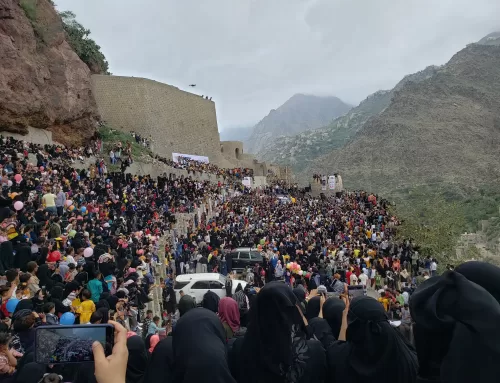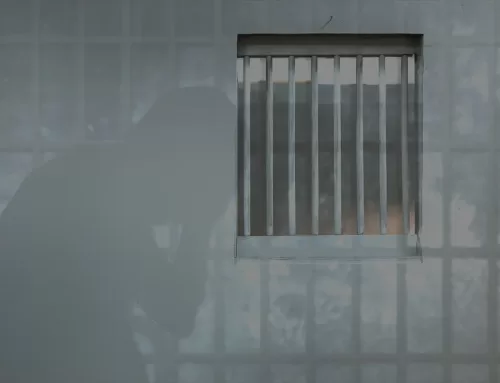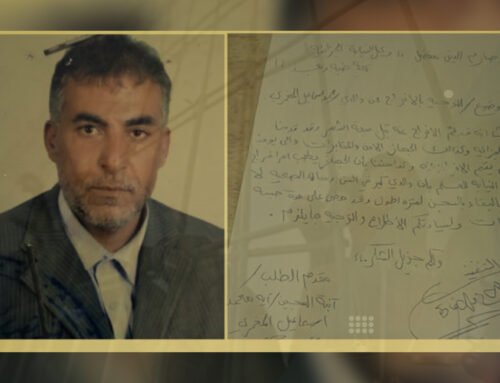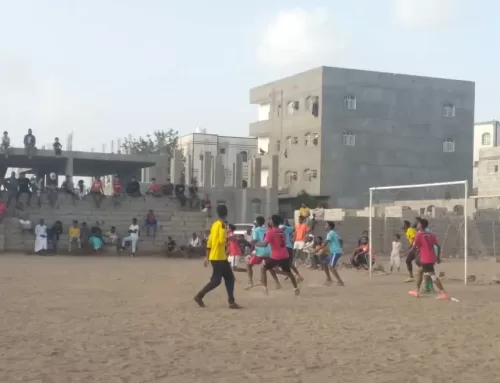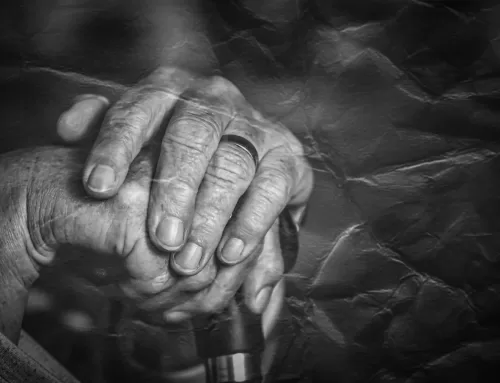“Mwatana” documents the hard waiting moments of detainees’ families and their concerns of the Coronavirus spread
Monday, March 16, 2020
In pain and sorrow, Fatima Muhammad Qahtan, 35 years old, talks about her detained father. She hopes, in the first place, that her father is still alive.
Since he was held on April 4, 2015 by the Ansar Allah armed group (Houthis), the fate of Muhammad Qahtan, the well-known politician, remains unknown. His family has not received any information reassuring them about him, as he is a man in his seventies.
In every round of negotiations between the parties to the conflict in Yemen, Fatima wishes the interlocutors will make progress on the case of prisoners’ and detainees’ exchange, and her father will be in the forefront of the first batches.
Like the thousands of families awaiting the return of their relatives, the last good news Fatima heard was last February, when the International Committee of the Red Cross (ICRC) announced a coming breakthrough, under its auspices, in the issue of prisoners and detainees. Due to the repetition of promises and failures, the Qahtan’s family “no longer believes everything the interlocutors say”, “however, we still have a hope that he will return even after a while.” Up to this moment, they have not seen any prisoners released under this agreement.
Fatima says, with suffocating tears, “when my father returns, he will be surprised by many things have changed in our lives: the increase in the number of his grandchildren; his son Zaid has got married to the girl my father nominated for him, and has got a girl child; his son Abdel-Rahman is studying higher studies abroad; the rest of his children enrolled in universities; my aunt, his older sister, has passed away. My father will sorrow when he sees his beloved mother lost her memory, as she suffered a stroke after his was detained and she only remembers few people, particularly those she knew in the eighties.” “My grandmother is very old, and my father’s heart is attached to her,” Fatima added.
Muhammad Qahtan, a prominent leader in Islah Party, born in 1958, is one of the most prominent forcibly disappeared politicians in the country. His family appears to be unsure of the seriousness of the warring parties for putting his name firmly on the lists of prisoners’ exchange deals. Fatima appeals to the parties concerned, “do not forget our father, whose hair has turned gray and his body weakened during five years of enforced disappearance.”
Fatima said: “During the past five years, we have only received contradicted information as some say that he is well, some says he has died in an air attack by the coalition, and some say he is ill. We do not know which information is true.” She added, “No one has responded to our pleas and our most basic rights. Our requests to have a written letter from our father were ignored that some people denied his existence originally.”
The Qahtan’s family hopes that he will be part of the prisoners’ and detainees’ swap deal announced by the International Committee of the Red Cross. “We want to see him. We want to hear his voice … We have nothing but supplication and patience. We supplicate to God to free and return him to us with his good health and mind.” Fatima said.
Yahya Al-Dailami… The haji (Pilgrim) who returned from Makkah to the prison
When Yahya Hussein al-Dailami decided to go to perform Hajj (pilgrimage) in Makkah, he was very confident that he would return to his home in Sanaa after completing his Hajj for one of his deceased female relatives. Yet, an ambush was waiting for Haji Yahya at Alfalj checkpoint, 10 km south of Marib city.
On August 9, 2019, the scholar Al-Daylami, along with his flight companion, Haji Fuad Fakher, was arrested when a security checkpoint of the authorities at Marib stopped the international transport bus. Some members of that checkpoint got into the bus calling for these two name and took them to unknown destination.
Ibrahim Al-Dailami (37 years old), the younger brother of the religious scholar Yahya Al-Dailami’s, said, “From that date until now, we do not know where they took him to. We do not know how his health is. He is diabetic, and we do not know whether they allow him to have his medication or not.” Ibrahim added by mentioning the good qualities in his elder brother’s personality, “We do not fear for his psychological condition and morale, he is a man of strong faith and has lived the life of prisons and detention centers before, but his health is all what matters to us. He is diabetic and suffers from Joint Friction and Gout.”
The scholar Yahya Al-Dailami is one of the most famous preachers of the city of Sana’a. 15 years ago, he was imprisoned in the central prison in Sana’a during his opposition to the war that the former President Ali Abdullah Saleh’s regime waged over the Houthi movement in Saada in early 2004. When the popular uprising erupted in 2011, the man was in the frontline of the protesters against the regime of President Ali Abdullah Saleh. He was one of the most famous preachers of the Change Square, who crossed the language of sectarian incitement and called for coexistence and understanding between the people of different sects. However, this moderate approach did not intercede for him when he found himself in the hands of kidnappers who were following the orders of influential leaders in the government of President Hadi.
The scholar al-Daylami supports a large family and sons from two wives. The youngest of his sons is Ali (5 years), who was very attached to him.
Ali calls on his father every day “Baba Baba”, while his grandmother (Yahya Al-Dailami’s mother) sometimes mumbles words about her kidnapped son unconsciously as if his presence does not leave her for a moment, as Ibrahim says. He adds, “The mother is very affected and supplicates to God every day to free him.”
The two families of Al-Dailami and Fakher are keenly and eagerly awaiting the news about the rounds of negotiations on the agreement of prisoners and detainees exchange. “We supplicate May Allah (God) free them.” Ibrahim said, “My brother was not a fighter in a battle so as to consider him a captive, but he was kidnapped while on his way to his country with his Ihram cloths in his hands… They do not have humanity nor morals of Muslims!”
Who will wipe the tears of Zakariya’s Mother?
“Please, I am appealing you to help me visit my son and find out the place where he is detained”, this is how the mother of Zakariya Ahmed Qasim appeals the humanitarian organizations and official agencies to help her find out the fate and whereabouts of her son who has been detained since January 2018 in Aden.
She added, describing how her 65-year-old son was taken after Fajr prayer, by masked and armed people, “They took him by force. Since that date, we having heard about him.”
Although the Riyadh agreement between the Southern Transitional Council and the internationally recognized government of President Abd Rabbu Mansour Hadi to exchange prisoners and detainees five months ago, prisons and detention centers are still crowded with hundreds people from all parties. Zakariya, who was a social activist in the charitable field, is one of the forcibly disappeared, whose families search for any statements regarding their health and psychological status.
Zakariya’s Mother said that she received assurances from security authorities in Aden earlier this year state that Zakariya was in their possession. However, those authorities denied his existence later. Then, Zakariya’s mother and children entered into a cycle of anxiety and stormy thinking.
Zakariya’s Mother said, “I don’t know whether my son is still alive or has he died under torture.” “Two years have gone by since my son was detained and every day I ask myself whether my son is well or is he dead. If he is alive then how is his health and psychological condition? How is his condition? But my faith in God is big as I have a sense of being able to find him and God will not disappoint me” she added.
According to Zakaria’s relatives, he used to distribute aid through his charitable organization, Iqraa. His family said that he is a peaceful person as he has never bore a weapon. His only work was limited to charity, providing aid and assistance to injured people.
Al-Mutawakel.. Three years into the Unknown
On April 27, 2017, while Dr. Mustafa Al Mutawakel was on his way returning from Sayoun following an international participation in a conference in Morocco, loyal soldiers to President Abdrabu Mansour Hadi government boarded the bus, on which he was traveling, in Al-Falj checkpoint in Marib. They took him to an undisclosed location and denied him any visits or communication with his family.
Dr. Mustafa travelled to Morocco to attend the Annual Conference for Investment Institutions, responding to an invitation he received in his capacity as the Chairperson of the General Investment Authority in Sana’a. His family said that he passed through the areas controlled by Hadi government, boarded a plane from Seiyun Airport and returned through the same airport. Then, he confidently traveled by land on a public bus towards Sana’a not imagining that an academic and a civilian person like him would be detained.
On May 15, 2017, his wife, the university professor Dr. Elham Al Mutawakel, travelled to Marib with a legal team to demand her legal right in visiting him. She was accompanied by three members of the Sana’a University Faculty Staff Syndicate, including the Head of the Syndicate, in solidarity with their abducted colleague.
In Marib governorate administration, she was treated as a guilty person, though she was just looking for her husband. “I never imagined that ill treatment by officials in Marib. I was treated as if I am Abdul Malik Al Houthi himself. I was just a panicked wife searching for her life mate” Elham said.
Although she endured the long travel between Sana’a and Marib, all doors were shut in her face and her suffering never subsided.
Before she has left Marib, she received a phone call from an anonymous phone number. The caller told her that Dr. Mustafa is no more in Marib and that he was handed over to Saudi Arabia. The caller added “You shouldn’t make it difficult for yourself and for us. It is better for you to leave”. And so she decided after two weeks of her visit to Marib.
Dr. Mustafa has three daughters and two sons. One of his sons passed away in Malaysia due to a medical mistake after a car accident. After the enforced disappearance of his father, Al Hussein, his name, lived only for few months in sorrow over his father, as his family said. Dr. Mustafa’s daughter said, “It was a catastrophic year for us; the disappearance of my father and the painful death of my brother.” She added, “We had to smuggle the corpse of my brother through Oman not to be taken in Marib, as they did with my father.”
“Coronavirus”.. Additional Concerns
In the first months of the current year 2020, the “Coronavirus”, known as “Covid-19”, has blown across the world, adding to the fear of families of detainees and enforcedly disappeared people in Yemen that this disease would spread to places where they are detained.
In December 2019, Mwatana released a study on the situation of the detention centers in Yemen. This study showed that the detention centers do not meet the international nor national standards in terms of the spatial environment and the basic services necessary for detention centers. In the event that Coronavirus spreads in the detention centers that do not have the minimum basic safety precautions, the results will be disastrous.
Abdul Karim Al-Iryani (55 years old), an employee in Ministry of Water and Environment, was detained from his workplace in Sana’a and was hiden for 23 days before the Houthi security authorities in Sana’a had announced his detention in the National Security Agency.
Abdul Karim’s oldest daughter, Abrar Al-Iryani, (19 years old), said, commenting on the news of the world spread of coronavirus, “Why are not my father and the fathers of many other girls released?!” “Any of my family members or I may die tomorrow of “coronavirus” or something else. What will happen if you return my father to us so that we live the rest of our days together?” she continued.
Abrar added, “It has been a year and three months since my father was detained. You can imagine how all those days have passed for him and for us; my mother drowns in her tears every day; I am living meaningless life and I lost my sense of hope; days are so heavy for my sisters.”
“We listen to the songs my father used to listen to, we read what he used to read, we watch what he used to watch, and we play what he used to play; there is no use of all that. Nothing can cover the absence of my father except his presence between us today or tomorrow” she continued.
And she concluded by saying, “Re-think about the disadvantages of detaining a 55-year-old man over himself and his family. Think about the joy that you will create for his family if you return him back to them so they live together the rest of their days. We are missing our father so much. Have mercy on us.”
Representatives of the parties to conflict in Yemen has agreed on a detailed plan to complete the first official large-scale exchange of prisoners and detainees since the beginning of the conflict. It is a first step towards fulfilling the parties’ obligations to release all prisoners and detainees being held in connection to the conflict in accordance with the Stockholm Agreement.
Counting on the acceleration of the parties’ implementation of their obligations under the prisoners and detainees exchange agreement remains a last hope to reduce the spread of the Coronavirus in the detention centers and save the lives of detainees.


